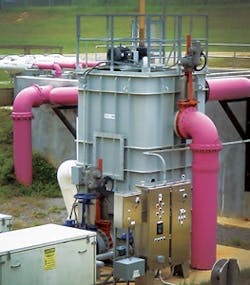Final Filtration: Filter Achieves TSS Discharge Limits
A chicken processing facility in central North Carolina generates a daily average of approximately 625 gal per minute (gpm) of wastewater from the various processes within the facility. The bulk of the treated wastewater is discharged to a creek, while about 175 gpm are recycled for reuse within the facility. The treated wastewater is required to meet stringent discharge limits, which include a total suspended solids (TSS) limit of less than 20 parts per million (ppm). To meet this limit, the plant needed a final filtration process that was simple to operate and maintain and performed reliably.
The Schreiber Fuzzy Filter was selected as the final filtration step in this wastewater treatment system. The filter can remove particles down to 4 µ with greater than 80% efficiency. It is a high-rate filter that can operate at hydraulic loading rates as high as 40 gpm per sq ft, which translates to significant footprint savings. The main advantage of this technology is that the media are highly compressible, so the bed porosity can be adjusted by changing the compression applied to the media. This feature provides the plant operators with the flexibility to make adjustments to the filtration characteristics in order to meet any changing influent conditions due to process upsets or seasonal variations.
The plant has been in service for almost 16 years, and the Fuzzy Filter has consistently produced average effluent TSS levels of 3 ppm or less. This has not only helped the plant avoid fines, but also save roughly 7.5 million gal of freshwater per month because the filter effluent water can be reused within the plant.
Download: Here
